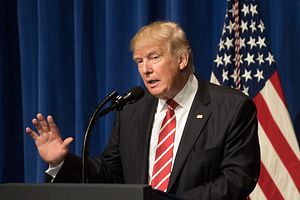East Asia’s diplomatic waters are troubled, and not only by new provocations from a nuclear North Korea. China is busy squeezing South Korea and Taiwan with economic sanctions and diplomatic maneuvering. Beijing is unhappy with Seoul’s close military cooperation with the United States and Taiwanese President Tsai Ing-wen’s pointed refusal to agree that China, however ruled, is “one country.” South Korea, having just picked a new leader in May, is still finding its footing after a tumultuous impeachment and removal of the former president. Unfortunately, so far U.S. President Donald Trump’s myopia and unpredictability are making things harder for his democratic allies in the region, and making Beijing’s bullying easier.
Trump is shaky on the two things South Korea wants most from the United States: a united front against North Korea and healthy bilateral trade. The U.S. president has sown doubts about his commitment to defending South Korea by repeatedly accusing the country of freeloading on U.S. military protection, including the U.S.-provided THAAD missile defense system. China must have cheered these statements; they align unexpectedly with its goal of clearing the peninsula of U.S. military influence. On North Korea’s threats, Trump’s bellicose tone and sometimes rash statements worry South Koreans and are obviously not coordinated with Seoul. They show the United States is not standing shoulder-to-shoulder with new Korean President Moon Jae-in, who has been speaking up to request global, peaceful defiance of Pyongyang’s provocations and a dual track approach of sanctions and dialogue with the North. But China’s Foreign Ministry last month criticized “certain people” who claim China must be responsible for North Korea and do more to denuclearize it, seemingly responding to Moon’s comments to that effect.
Trump is also disappointing on trade, where South Korea needs the United States as a strong partner because it’s hurting from Beijing’s sanctions on tourism and import. These are retaliatory measures over THAAD, which Beijing believes the United States will use to spy on China. To give just one example, the government has closed down dozens of Korea’s Lotte Group malls in China, often suddenly and on flimsy premises like “fire safety.” Helping South Korea get over this economic rough patch would be a great show of support from the United States, and one that could also push Seoul to accelerate THAAD’s installation. Instead, Trump has demanded a renegotiation of the Korea-U.S. Free Trade Agreement, which is supposedly “a horrible deal.”
Taiwan initially seemed to have an ally against China in President-elect Trump, but the honeymoon was short-lived. His December 2nd phone call with President Tsai made a splash in policy circles, but Trump has since reaffirmed the One China Policy, hosted Chinese President Xi Jinping, and refused a second phone call with Tsai. This last move added to the perception, already fueled by some of Trump’s statements, that Taiwan is just a “bargaining chip” for the United States to trade away at its convenience.
Troubling uncertainty continues to dominate as Trump cycles through diplomatic positions. Not long after declaring President Xi his new best friend, Trump backtracked, expressing disappointment with the little Beijing has done on North Korea. Then in June his administration approved a $1.4 billion arms deal with Taipei. But as Taiwan expert Shelley Rigger argues, Trump’s unpredictability and the tension it creates in the China-Taiwan relationship leaves Taiwan worse off now than under the Obama administration.
Meanwhile, China’s pressure on President Tsai’s (pro-U.S.) administration is going unanswered. Tsai’s refusal to accept the “1992 consensus” (on there being only one China) last summer led Beijing to suspend cross-Strait communication. This was followed by a sharp drop in visits to the island by mainland tourists, a significant revenue source for Taipei. And China has been ruthless in bullying other countries into reducing trade with Taiwan or switching diplomatic recognition from Taipei to Beijing, as happened in Panama. All of this has cost Tsai politically at home, where her approval rating last month dropped to 33 percent. Despite all the campaign talk of being tough on China, the Trump administration has so far taken no strategic action in response.
As democracies, South Korea and Taiwan are also hurt by Trump’s widely reported retreat on human rights. Both governments have invested significant resources and diplomatic energy in promoting themselves as East Asia’s champions of democracy, along with Japan. Last year South Korea’s peaceful protests against their president’s corruption made news around the world. And freedoms and rights are part of Taiwan’s global appeal and separateness from China. But such values shouldn’t get in the way, Trump has made clear, of diplomatic deal-making.
So far, Presidents Moon and Tsai are trying to ride the tiger of Trumpian uncertainty and stay on good terms with the U.S. president. Moon has given clear signals that he values Trump as a partner, praising him for his focus on North Korea and not overreacting to Trump’s accusatory statements about South Korean free-riding. Similarly, Tsai tried to set up another phone call with Trump and said recently that relations with the United States are improving. And Washington should be pleased that neither leader has buckled under Chinese pressure, though Moon did pause THAAD’s full installation for an environmental review.
President Trump could help bolster two important democratic allies and simultaneously strengthen America’s position in the region by moving beyond the simplistic logic of deal-making and investing in values-based, mutually beneficial relationships. Otherwise Beijing will continue to take advantage of Washington’s lack of vision to strong-arm its neighbors. Moon and Tsai are working hard to negotiate a complex, dangerous moment in East Asia, but they, like so many others, need a much better friend in the White House.
Chris Carothers is a Ph.D. Candidate in Government and an Ashford Fellow at Harvard University.
































